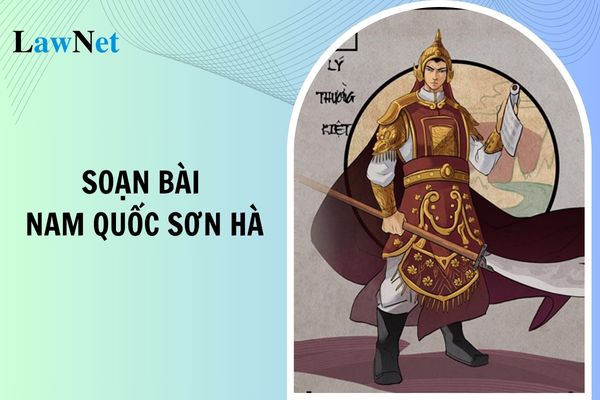Below are guidelines on preparing the lesson "Nam quốc sơn hà" for grade 8 students in Vietnam.
What are guidelines on preparing the lesson "Nam quốc sơn hà" for grade 8 students in Vietnam?
The poem "Nam Quốc Sơn Hà" is renowned in Vietnam's history and is regarded as the country's first declaration of independence. Below is a guide for preparing the lesson "Nam Quốc Sơn Hà":
|
Guidelines on preparing the lesson "Nam quốc sơn hà"
I. Author and Work
1. Author
- Ly Thuong Kiet (born in 1019 – died in 1105) was a famous military and political figure during the Ly dynasty, serving under three kings: Ly Thai Tong, Ly Thanh Tong, and Ly Nhan Tong.
- Ly Thuong Kiet is known for numerous major victories, including defeating the Song invaders on the Nhu Nguyet River.
2. Work
- Structure of the Poem "Nam Quốc Sơn Hà" is divided into 2 parts as follows:
+ Part 1 (First two lines): Affirmation of territory sovereignty clearly defined.
+ Part 2 (Last two lines): Affirmation of the determination to resist the enemy.
- Main content: The poem "Nam Quốc Sơn Hà" asserts the sovereignty of Dai Viet, emphasizing that the country belongs to the Southern King as ordained in the celestial books. It warns invaders of a devastating defeat.
- Value of content: Expresses faith in the power of justice. Asserts the territorial sovereignty of the country and elevates the determination to defend sovereignty against invaders.
- Artistic value
+ The poem is concise and succinct.
+ Use of language is strong, resolute, and eloquent.
II. Lesson Preparation: Nam Quốc Sơn Hà
Question 1: The poem is considered our country's first "declaration of independence." How do you understand a "declaration of independence"?
A "declaration of independence" is an official statement declaring a nation's independence from the rule of another country. It asserts sovereignty, inaugurates an era of freedom, and inspires patriotism and determination to protect the nation's independence.
Question 2: The word “cư” in the original text can be translated as “ngự” (govern), it can also be translated as “ở” (reside). Which translation do you think better reflects the spirit of a "declaration of independence"? Explain your opinion.
The term “cư” as “ngự” (govern) more clearly expresses the spirit of a "declaration of independence". This is because “ở” (reside) means someone regularly lives at a particular location. In contrast, “ngự” (govern) means overseeing and managing all aspects. A "declaration of independence" is a nation's proclamation of autonomy, thus using the term “ngự” (govern) is more appropriate and meaningful.
Question 3: What arguments did the author use to assert our country's sovereignty?
- The mountains and rivers of the South belong to the Southern King, just as in the North, the Northern King reigns. Territory is matched to the sovereign. This is an undeniable truth that must be respected.
- In the spiritual lives of Vietnamese and Chinese people, Heaven is the ultimate authority, ordering and deciding all matters. The territorial boundaries of the Southern King, of the Southern people, have been defined in the heavenly books, indicating that no one is allowed to contravene Heaven's mandate.
Question 4: What do you think the final lines of the poem warn against the invaders? How do you assert that?
The last two lines express a warning and affirm that any enemy invading Dai Viet's territory will face defeat because invading the Southern land is against the decree of Heaven.
Question 5: Which line in the poem leaves the deepest impression on you? Why?
I am most impressed with the line "Nhữ đẳng hành khan thủ bại hư" because it carries a strong and resolute meaning. It reflects the confidence and determination of the Dai Viet people in protecting territorial sovereignty.
Question 6: What insights have you gained for yourself after learning this poem?
Studying the poem "Nam Quốc Sơn Hà" has provided me with several important insights:
- Patriotism: The poem evokes pride and love for the homeland and nation.
- Determination to defend sovereignty: It reminds us of the importance of protecting sovereignty and territorial integrity.
- Unity: Victory against invaders can only be achieved when the whole nation unites and works together.
- Confidence: The poem expresses confidence and resolute determination not to yield to any enemy.
|
Note: The above information is for reference purposes only!

What are guidelines on preparing the lesson "Nam quốc sơn hà" for grade 8 students in Vietnam? What are grounds for assessments of the training outcomes of grade 8 students in Vietnam? (Image from the Internet)
What are grounds for assessments of the training outcomes of grade 8 students in Vietnam?
According to Article 8 of Circular 22/2021/TT-BGDDT, the grounds for assessments of the training outcomes of grade 8 students are based on the essential qualities and general competencies required at levels appropriate to the subject and educational levels specified in the overall program, and the specific competencies required in the curriculum in the general education program.
What are regulations on classification of the training results of grade 8 students in each semester in Vietnam?
According to Clause 2, Article 8 of Circular 22/2021/TT-BGDDT, the training results of grade 8 students each semester are classified into 4 levels:
- Good Level: Meets the requirements regarding qualities prescribed in the general education program and shows many outstanding signs.
- Quite Good Level: Meets the requirements regarding qualities prescribed in the general education program and shows outstanding signs but not yet at the Good level.
- Average Level: Meets the requirements regarding qualities prescribed in the general education program.
- Not Yet Reached Level: Does not meet the requirements regarding qualities prescribed in the general education program.


